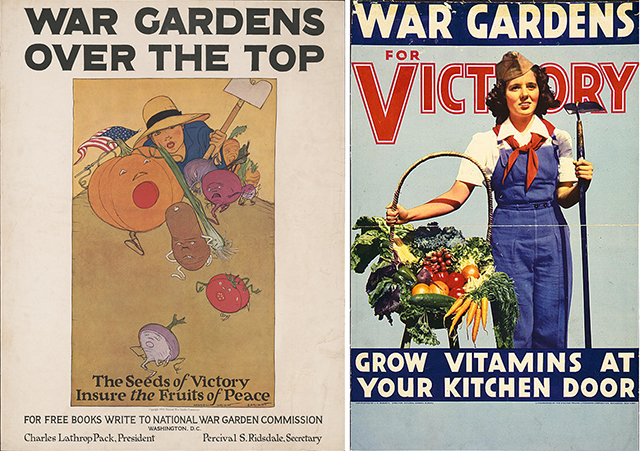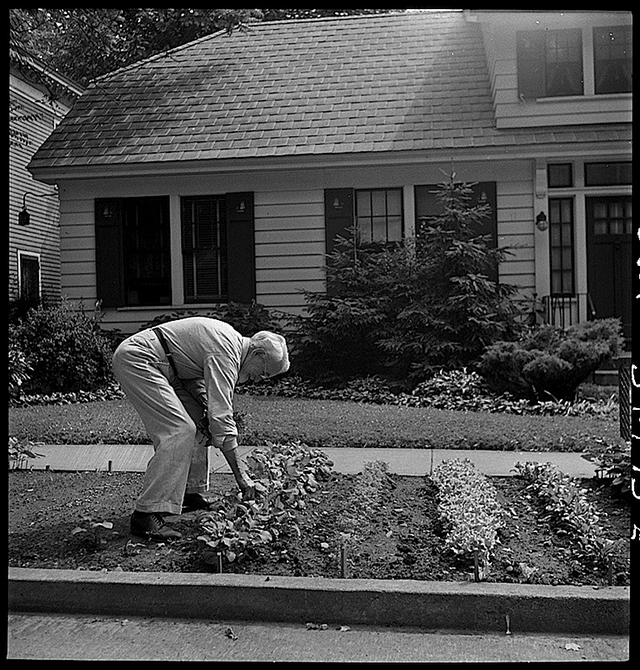Gastropod looks at food through the lens of science and history.
Co-hosts Cynthia Graber and Nicola Twilley serve up a brand new episode every two weeks.
Co-hosts Cynthia Graber and Nicola Twilley serve up a brand new episode every two weeks.

LEFT: "War gardens over the top. The seeds of victory insure the fruits of peace," Maginel Wright Enright, National War Garden Commission, 1919 (Library of Congress). RIGHT: "War gardens for victory—Grow vitamins at your kitchen door," lithographed by the Stecher-Traung Lithograph Corporation, Rochester, New York, between 1939 and 1945 (Library of Congress).
Anastasia Day is a Ph.D. candidate in Capitalism, Technology, and Culture at the University of Delaware, where she studies home food production in the twentieth century. You can read more about her work at her blog, The Historian in the Garden.
Leah Penniman is a food sovereignty activist and the co-director and farm manager at Soul Fire Farm in New York State. Her book, Farming While Black, is a comprehensive guide for African-heritage growers to reclaim their dignity as agriculturists and for all farmers to understand the distinct, technical contributions of African-heritage people to sustainable agriculture, as well as a hands-on manual for all aspects of small-scale farming.
Tepfirah Rushdan is co-director of Keep Growing Detroit, a nonprofit organization dedicated to food sovereignty. A long-time activist, Rushdan is involved in vacant land remediation, developing conservation skills in youth, farming training programs, and resiliency research.
Raychel Santo is a senior research program coordinator at the Johns Hopkins Center for a Livable Future, where she studies urban agriculture, local food policy, and the relationship between diet and climate change. We discussed her 2016 paper, “Vacant Lots to Vibrant Plots: A Review of the Benefits and Limitations of Urban Agriculture.”
Neil Mattson is an associate professor at the Cornell School of Integrative Plant Science. His research focuses on the influence of environmental factors and cultural practices on greenhouse crops, and he is currently midway through a National Science Foundation-funded study looking at the environmental and economic implications of urban agriculture in greenhouses and vertical farms.
Tamar Haspel is a James Beard Award-winning freelance writer and columnist at The Washington Post. Her writing centers around food supply issues, including biotech, food additives, antibiotics, organics, nutrition, and food policy.
While making this episode, we also talked with historian and University of California extension advisor Rose Hayden-Smith to learn more about the Victory Gardens' precursors: the Liberty Gardens of World War I. She has documented this history in her book, Sowing the Seeds of Victory: American Gardening Programs of World War I.
While making this episode, we also talked with UC Berkeley socio-economist Robin Marsh about small-scale and urban farming in the Global South. Her research spans international agriculture and rural development.

"Oswego, New York. A citizen working on Sunday morning in the victory garden he has made on the edge of the street." Photograph by Marjory Collins, June 1943. (Library of Congress)
Click here for a transcript of the show. Please note that the transcript is provided as a courtesy and may contain errors.